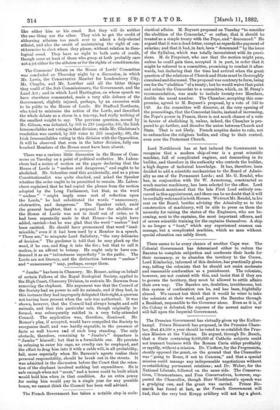There was a carious little discussion in the House of
Com- mons on Tuesday on a point of political msthetics. Mr. Labon- chere had a notice of motion on the paper declaring that the House of Lords is " useless and dangerous," and ought to be abolished. Mr. Schreiber read this accidentally, and as a pious Constitutionalist was quite shocked, and asked the Speaker whether the order ought to be permitted to remain. Mr. Labon- chere explained that he had copied the phrase from the motion adopted by the Long Parliament, but that, as the word useless " " might imply some sort of reflection upon the Lords," he had substituted the words " unnecessary, obstructive, and dangerous." The Speaker ruled, amid the general laughter, that a proposal for the abolition of the House of Lords was not in itself out of order, as it had been repeatedly made in that House—he might have added, carried—but he was glad that the word " useless " had been omitted. He should have pronounced that word "inad- missible," even if it had been used by a Member in a speech. "These are," to misquote Lord Salisbury, "the very delicacies of decision." The gardener is told that he may pluck up the weed, if he can, and fling it into the fire ; but that to call it useless, is an affront to botany. He ought only to have con- demned it as an " infructuous superfluity" in the paths. The Lords are not literary, and the distinction between " useless " and " unnecessary " may, perhaps, escape them.


































 Previous page
Previous page